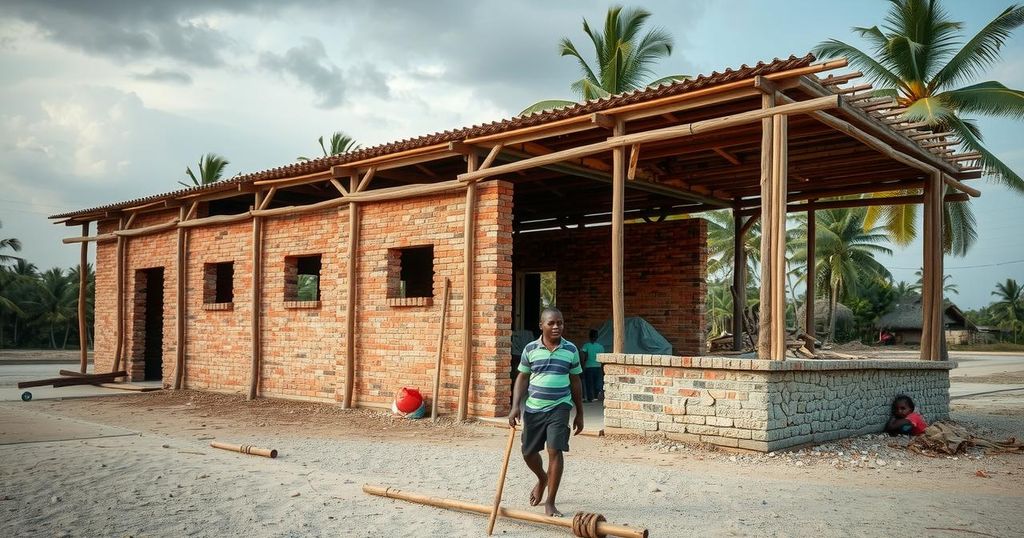Mozambique Begins Construction of Shelters for Cyclone Chido Victims

Mozambique has initiated shelter construction for victims of Cyclone Chido, which caused extensive damage and loss of life in northern regions. The government is prioritizing resilient materials for rebuilding and enhancing construction training for locals. UNICEF reports significant numbers of affected individuals and infrastructure damage, signaling a critical need for urgent aid and disaster preparedness as more storms are anticipated.
Mozambique has commenced the construction of shelters for victims affected by Cyclone Chido, which devastated northern regions of the country over the past weekend. The cyclone resulted in the loss of at least 70 lives and injured around 600 individuals, leading to widespread destruction.
During a visit to the impacted regions, Trade and Industry Minister Silvino Moreno emphasized the government’s commitment to aiding the storm’s victims alongside international partners. He indicated that the primary focus will be on building shelters using resilient materials to withstand future storms better. Many homes previously constructed from mud and reeds were completely obliterated by Cyclone Chido’s intense winds.
Moreno acknowledged the need for improved construction training for local residents to enhance the durability of their homes. Furthermore, prior to affecting Mozambique, Cyclone Chido inflicted severe damage in Mayotte, a group of French islands, causing fatalities and destabilizing local infrastructure, particularly for at-risk communities.
The cyclone also brought significant damage to southern Malawi, leading to the destruction of numerous houses and critical infrastructure. Mozambique’s meteorology agency has noted the likelihood of additional storms occurring over the next three months amidst the ongoing rainy season, urging proactive preparedness from the populace.
According to UNICEF, roughly 174,000 individuals have been impacted by the cyclone’s havoc, with the figures anticipated to rise as further assessments are conducted. The destruction extends beyond homes, with thousands of classrooms and 20 health facilities reportedly damaged.
Michael Chimedza, the head of UNICEF’s field office in Mozambique’s Zambezia province, stated that provisions have been mobilized to assist 50,000 affected persons, including funding for local-level emergency response training. The cyclone has disproportionately affected Nampula, Cabo Delgado, and Niassa provinces, leaving over 25,000 families without electricity and damaging essential resources such as health units and roads.
Moreover, these recent events pose an alarming risk of exacerbating the ongoing cholera outbreak within the region, as emphasized by relevant humanitarian organizations.
The region of Mozambique is prone to severe weather phenomena, particularly during the rainy season, which runs from November to April. Cyclones present significant threats, causing loss of life and widespread infrastructure damage. Recent historical events reflect the ongoing vulnerability of communities to natural disasters, and the response from governmental and non-governmental organizations plays a crucial role in providing immediate assistance and long-term recovery.
In summary, the construction of shelters in Mozambique for Cyclone Chido victims aims to offer immediate relief and build resilience against future storms. The substantial impact on human life, the necessity for better construction practices, and the increased risk to health due to ongoing cholera outbreaks underscore the urgency for comprehensive disaster preparedness and response strategies.
Original Source: www.voanews.com








